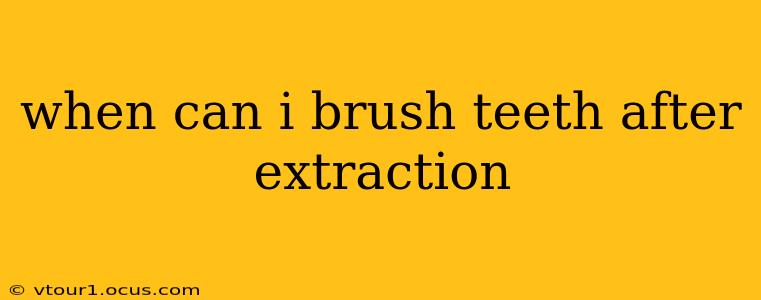Having a tooth extracted can be a bit unsettling, and knowing when you can resume your normal oral hygiene routine is a top concern. The short answer is: wait until the bleeding has stopped and the extraction site has begun to clot. This typically takes several hours, sometimes even longer depending on the complexity of the extraction. Rushing the process can dislodge the blood clot, leading to a painful and potentially serious complication called dry socket.
Let's delve deeper into the specifics and address some common questions.
How Long Should I Wait Before Brushing After a Tooth Extraction?
Generally, you should wait at least 24 hours before brushing your teeth near the extraction site. This gives the area ample time to form a stable blood clot, crucial for healing. However, it's perfectly fine to gently brush the rest of your teeth as usual. Just avoid the immediate vicinity of the extraction.
What Happens If I Brush Too Soon After a Tooth Extraction?
Brushing too soon can dislodge the blood clot, exposing the underlying bone and nerves. This is known as dry socket, a painful condition characterized by intense throbbing pain, bad breath, and sometimes even a visible empty socket. Dry socket requires professional treatment, often involving medicated dressings to promote healing.
Can I Rinse My Mouth After a Tooth Extraction?
Gentle rinsing is generally recommended, but only after the initial bleeding has subsided, typically after a few hours. Avoid vigorous rinsing or spitting, which can disrupt the clot formation. Instead, use a saltwater rinse (1/2 teaspoon of salt dissolved in 8 ounces of warm water). This helps to keep the area clean and promote healing. Your dentist or oral surgeon might also recommend a specific mouthwash.
When Can I Use Mouthwash After a Tooth Extraction?
You should avoid using mouthwash, especially alcohol-based mouthwashes, for at least 24 hours after an extraction. Alcohol can irritate the extraction site and hinder the healing process. If your dentist recommends a specific mouthwash, follow their instructions carefully.
What Should I Do If I Experience Pain After a Tooth Extraction?
Mild discomfort and swelling are expected after an extraction. However, severe pain, excessive bleeding, or signs of infection (pus, fever, increased swelling) should be reported to your dentist or oral surgeon immediately. They can provide appropriate pain relief and assess the need for further treatment.
How Can I Prevent Dry Socket After a Tooth Extraction?
Following your dentist's post-operative instructions carefully is key to preventing dry socket. This includes avoiding smoking, using a straw, and refraining from vigorous rinsing or spitting. Maintaining a healthy diet and taking prescribed medications also plays a significant role in preventing complications.
Can I Eat After a Tooth Extraction?
You should stick to a soft, liquid diet for at least the first 24 hours. Avoid anything that requires chewing vigorously near the extraction site. Gradually introduce firmer foods as you feel comfortable, but continue to avoid hard or crunchy foods for a few weeks. Your dentist can offer more specific dietary guidance based on the complexity of your extraction.
Remember, these are general guidelines. Always follow the specific instructions provided by your dentist or oral surgeon after your tooth extraction. They know the specifics of your procedure and can provide the most accurate advice for your individual case. Prompt attention to aftercare significantly improves your chances of a smooth and painless recovery.
